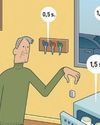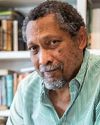
OFTEN, WHEN WE describe a medical condition as “psychosomatic”, what we actually mean is “not real”. But this is a mistake that nobody who reads Suzanne O’Sullivan’s endlessly thought-provoking book is likely to make again. As she demonstrates through a collection of fascinating case studies from across the world, just because you’re suffering from an illness not caused by any disease, that doesn’t mean you’re not suffering from an illness.
According to O’Sullivan (a London-based neurologist), every illness has—to a greater or lesser extent—three elements. Two are the physical and the psychological, with our fear that there might be something wrong causing the brain to pick out aches and pains it would normally leave in the background as part of the body’s “white noise”. The third is cultural: that people learn from those around them—and from their communities’ prevailing beliefs—the form the illness should take.
This certainly applies to the book’s most striking cases: girls from immigrant families in Sweden who take to bed unable to move or eat for months, even years; the US embassy staff in Cuba in 2017 who believed they were being attacked by some sort of sonic ray in what had long been an enemy country, and developed shared symptoms that no tests could explain.
But the same thing also affects our more everyday experiences of medicine. For O’Sullivan, one problem in the West is over-diagnosis. On the whole, people feeling ill want to have a known disease diagnosed, and doctors want to find one. But what if the symptoms are a signal that something else in their lives isn’t right? In fact, a diagnosis can lead to people acting—and even being—iller than they are…
Diese Geschichte stammt aus der May 2021-Ausgabe von Reader's Digest UK.
Starten Sie Ihre 7-tägige kostenlose Testversion von Magzter GOLD, um auf Tausende kuratierte Premium-Storys sowie über 8.000 Zeitschriften und Zeitungen zuzugreifen.
Bereits Abonnent ? Anmelden
Diese Geschichte stammt aus der May 2021-Ausgabe von Reader's Digest UK.
Starten Sie Ihre 7-tägige kostenlose Testversion von Magzter GOLD, um auf Tausende kuratierte Premium-Storys sowie über 8.000 Zeitschriften und Zeitungen zuzugreifen.
Bereits Abonnent? Anmelden

EVERY SECOND COUNTS: TIPS TO WIN THE RACE AGAINST TIME
Do you want to save 1.5 seconds every day of your life? According to the dishwasher expert at the consumer organisation Choice, there’s no need to insert the dishwashing tablet into the compartment inside the door.

May Fiction
An escaped slave's perspective renews Huckleberry Finn and the seconds tick down to nuclear Armageddon in Miriam Sallon’s top literary picks this month

Wine Not
In a time of warning studies about alcohol consumption, Paola Westbeek looks at non-alcoholic wines, how they taste and if they pair with food

Train Booking Hacks
With the cost of train travel seemingly always rising, Andy Webb gives some tips to save on ticket prices

JOURNEY TO SALTEN, NORWAY, UNDER THE MIDNIGHT SUN
Here, far from the crowds, in opal clarity, from May to September, the sun knows no rest. As soon as it’s about to set, it rises again

My Britain: Cheltenham
A YEAR IN CHELTENHAM sees a jazz festival, a science festival, a classical music festival and a literature festival. Few towns with 120,000 residents can boast such a huge cultural output!

GET A GREEN(ER) THUMB
Whether you love digging in the dirt, planting seeds and reaping the bounty that bursts forth, or find the whole idea of gardening intimidating, this spring offers the promise of a fresh start.

Under The GRANDFLUENCE Suzi Grant
After working in TV and radio as an author and nutritionist, Suzi Grant started a blog alternativeageing.net) and an Instagram account alternativeageing). She talks to Ian Chaddock about positive ageing”

Sam Quek: If I Ruled The World
Sam Quek MBE is an Olympic gold medalwinning hockey player, team captain on A Question of Sport and host of podcast series Amazing Starts Here

Stand Tall, Ladies
Shorter men may be having their moment, but where are the tall women?